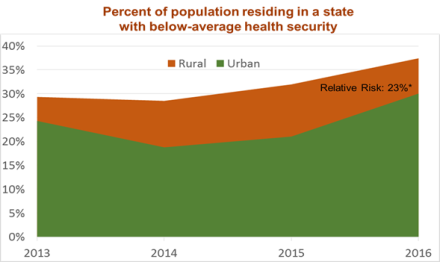The U.S. has experienced relatively mild hurricane seasons in recent years, and this trend may continue in 2017 according to some models. Hurricane season reminds us of just one of the many types of events that can threaten the health status of large groups of people in the U.S. each year. These events – including storms, fires, floods, infectious disease outbreaks, and infrastructure failures – are uncertain as to their exact location, timing, geographic scale, and intensity. For this reason, health security experts recommend that all states and communities maintain a broad spectrum of health protections that help to keep people safe and healthy regardless of the type of hazard that may occur. Unfortunately, the latest results from a national index of health security indicates that these protections are far from equal in strength across the U.S.
The National Health Security Preparedness Index uses big data and analytics to summarize the strength of health security protections across the U.S. and to track changes over time. The latest results show trends for the period 2013 through 2016 for every U.S. state and the nation as a whole. The comforting news is that health security has trended upward steadily for the nation as a whole. The troubling news is that some people enjoy much stronger protections than others based solely on where they live. For example, the Index shows that residents of the Deep South experience health security levels that fall significantly below the national average, despite their history of exposure to hurricanes and other damaging storms. Across the U.S., states with higher poverty levels, larger rural populations, and lower rates of health insurance coverage tend to fall below the national average on measures of health security.
The Index was created by the U.S. Centers for Disease Control and Prevention, and is now supported by the Robert Wood Johnson Foundation. Last week we shared insights from the latest Index results at the Preparedness Summit 2017 in Atlanta, one of the largest convenings of health security stakeholders in the U.S.
Whether or not you live in a region vulnerable to hurricanes, you have many reasons to care about health and social systems and their ability to protect people when hazardous events occur. For this reason, you will want to visit the Index website and explore its data and measures. And you can join the health security Innovator Challenge by devising a novel way to use the Index in stimulating actions that strengthen health security.
